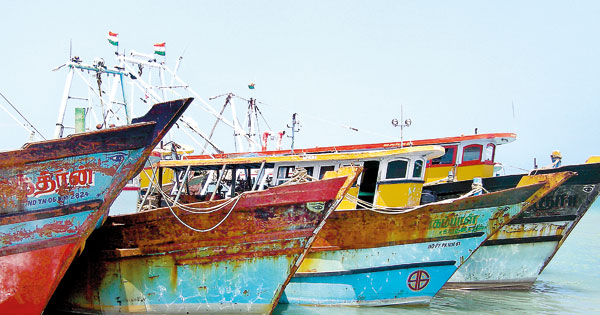News
Indian trawlers moored by TN ban, but illegal fishing continues in ‘Vaththai’ boats in Lankan waters
Although South Indian mechanised trawlers are restricted from fishing due to the Tamil Nadu government’s 61-day ban, their fishermen keep coming in traditional vaththai boats to engage in illegal fishing in Sri Lankan waters, say Sri Lanka’s Northern fisherfolk.
Their complaint comes amid their protest over a proposal to permit Indian fishermen to fish in Sri Lankan waters under a licence system, while the Tamil Nadu government’s 61-day ban on fishing by mechanised vessels is in force from April 15 to support fish breeding.
At Pesalai in Mannar, fishermen said they saw Indian fishermen in vaththai boats resorting to banned fishing methods near Kuthiramlai off the Mannar coast this week.

File pic: Some of the Indian boats taken into custody by the Navy for poaching and using banned fishing methods in Sri Lankan waters
Just as the massive Indian vessels equipped with high-powered engines use illegal fishing methods, the vaththai fishermen also use fishing methods banned in Sri Lanka. The mechanised vessels use bottom trawling, while the Vaththai fishermen use bottom set gill nets. The gill nets are laid on rocky sea-bed mainly to harvest lobster but they pose a threat to other rich marine resources and corals in Mannar.
Mannar Fisheries Federation chief Justin Zoysa told the Sunday Times that in a vaththai boat, Indian fishermen would bring bottom set gill nets that weigh roughly around 200-300 kilos to fence off at least ten sea miles.
“It looked like a fence underneath the sea, our fishermen cannot engage in fishing when these nets are laid. Given this irresponsible behaviour of the Indian fishermen, how can we allow giving fishing permits to Indian fishermen at the expense of our livelihood?” Mr Zoysa asked, while vehemently opposing the licencing system even though Fisheries Minister Douglas Devananda said it would only apply to small-scale Indian fishermen – not to mechanised trawlers.
The 61-day annual fishing ban which came into effect from April 15 to June 14 was introduced by the Tamil Nadu Fisheries Department in 2017 to preserve the marine ecosystem. Prior to this, it was 45 days only.
Some 12,000 Indian mechanised trawlers would be on the shore during this period, with the state government providing dry rations and monetary assistance (INR 5000) to support fisherfolk families.
However, a section of the Tamil Nadu fisherfolk community requested the state government to shift the breeding ban period to November-December North-East monsoon period during which several fishermen have died while fishing due to the rough sea conditions. On the contrary, the calm sea during the April-May period is advantageous for fishing.
On Friday, a delegation from the National Fisheries Federation, an influential fisherfolk body with more than 100,000 members across Sri Lanka, met Minister Devananda to raise concerns over his proposal for licensing system.
“Initially the proposal was suggested from the Indian side. We too put forwarded our observations and comments. No final decision was taken on this. I have instructed the Navy to continue to arrest the Indian trawlers that enter our waters,” Minister Devananda was quoted as saying in a statement issued by the Ministry.
The Minister also alleged that certain media reports misquoted him and gave a negative impression to the public that the decision to give fishing licences to Indian fishermen had already been taken. “I’ll never take any decisions that would affect our fishermen’s interests and their livelihood,” he said.
Minister Devananda told the Sunday Times that a proposal to issue licences to Indian fishermen was only one of the options mentioned.
He said there were other options which were being considered and they hoped to come up with other proposals to resolve the issue.
Though the Minister downplays the move to grant permits for Indian fishermen as a mere proposal, Northern fishermen unions have called for a meeting with him to express their opposition to the proposal.
Northern fisherfolk leaders said that the ministry’s licence proposal could have been averted, if it implemented the decisions of the Indo-Lanka Joint Fisheries Commission meeting held on November 5, 2016.
“It was decided to launch joint patrols by the coastguards of the two countries to ensure that fishermen are not trespassing into each other’s territorial waters. Also, the Indian delegation assured to stop the practice of bottom trawling within a specific time period but nothing happened,” Kayts Fisheries Cooperatives Federation Leader Annalingam Annarasa told the Sunday Times, while warning if the authorities went ahead with the proposal, they had no option but to take to the streets with their families.


